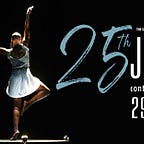Digital JOMBA! Fringe transcends African borders
By Genesis Cele
The JOMBA! Digital Fringe is a platform that gives new and upcoming artists specifically choreographers and dancers the opportunity to showcase their digital/dance films. The Fringe has always been an ‘open application’ platform for established South African dancers to try out new work, or for upcoming dancers to debut new work. However, due to the pandemic and the Fringe going online, JOMBA! Received close to 20 applications from all over Africa, including places like Madagascar, Nigeria, The DRC and Uganda. Only eight of the submitted pieces were showcased last night and the top three received cash prizes for their outstanding work. The expert adjudicating panel included David April, a director, choreographer and lobbyist in the realm of South African dance and performance, based in Gauteng; Tiny Mungwe, a South African film/ Tv producer based in Cape Town; and Smangaliso Ngwenya, a dancer, performer, writer, choreographer, videographer and editor based in Gauteng.
The winning performance piece came from Uganda’s Robert Ssempijja. His piece, THE MYTH OF SELF ISOLATION spoke to the challenges of self-isolation in spaces with poor living conditions. He starts the piece dancing in a very narrow corridor between a house and a brick wall with the camera carefully directing the viewers eye to the bricks creating the wall and how they are each isolated by the cement that separates them. This speaks to confinement. It is impossible to self-isolate in spaces where, like the bricks, people live on top of each other. Ssempijja’s piece speaks to how self-isolation is a privilege that not everyone can afford. Something as simple as washing one’s hands or working from home is impossible for some due to the living conditions (largely on the continent of Africa) they find themselves in. Ssempijja performs in a market place to show that even working from home isn’t an option for people who work as street vendors, selling food and other goods at markets. His fluid movement language and astute message painted against a backdrop of poverty that ravages these spaces.
In second place was South Africa’s Sabelo Cele. His piece (Rea)-Leaze Chains speaks to breaking free from whatever chains keep us mentally and physically enslaved. For most of the piece the video is in black and white, maybe as a metaphor of the colourless trapped spaces we find ourselves in. Written on Sabelo’s body are some of the things that keep him chained such as poverty, sexuality, loneliness and wanting to be accepted by other people. He calls for people to firstly realize the chains that keep them bound and to break free from them as he does in the last series of shots, where he walks into the ocean, unchained, no words written on his body and living in full colour.
South Africa’s Pavishen Paideyen came third with his piece AHAM-I AM that speaks to the prejudice that South African Indians face. The colour, the synchronicity of the performers, the choreography as well as the use of the camera to direct the audiences eye to what the choreographer wants them to see, was beautifully executed. There were truly great moments in the piece, one that particularly caught my eye was when one of the gender non-conforming dancers who seemed to identify with the LGBTQIA+ community was being forced to fit inside a box. Instead they break free and uses the box as a stepping stone to dance on. This piece was an excellent way of showing the issues that the Indian community faces.
These three works are available on the JOMBA! website to view for the remaining duration of the Digital JOMBA! Contemporary Dance Experience. http://www.jomba.ukzn.ac.za
